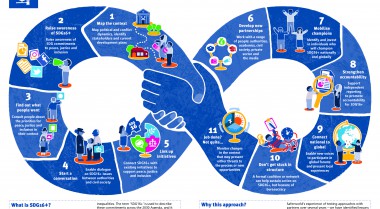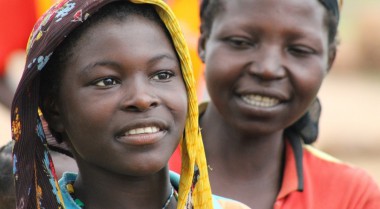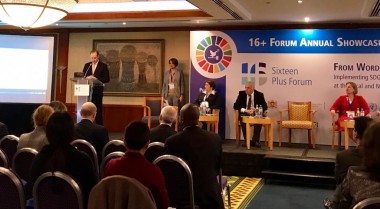
Embracing SDG16+ in Somaliland: an opportunity for change
Hopes are high in Somaliland after a largely peaceful presidential election in November 2017 ushered in a new government pledging to launch development initiatives to improve the lives of Somalilanders. Abdijalil Dahir Aqarshe and Jordan Street argue that the Sustainable Development Goals - or SDGs - have a crucial role to play in supporting this shift and bringing together seemingly disparate development efforts.
This appetite for change is giving rise to new, innovative campaigns to improve the lives of people in Somaliland.
Change is in the air in Somaliland. Large political shifts, including the recent presidential election, have re-invigorated many civil society groups and activists who are pushing for wider reform across the country. There are significant development challenges that still need to be overcome – widespread poverty and a crippling drought that hit Somaliland earlier this year have taken a large toll – but among the population the general feeling is one of optimism and a real belief that things will improve.
This appetite for change is giving rise to new, innovative campaigns to improve the lives of people in Somaliland. Three areas in particular are gaining traction with decision makers and galvanising civil society – the focus on eradicating female genital mutilation (FGM), making justice accessible for all and the move to increase women's participation in politics through gender quotas. A closer look at all three of these areas reveals why action is urgently needed and how it is achievable:
- In Somaliland, an estimated 97 per cent of women are survivors of FGM. Prominent Somalilanders like former foreign minister Dr Edna Adan, and UK-based social activist Nimco Ali have put the issue at the forefront of election discussions in Somaliland – obtaining political commitments from all three presidential candidates to criminalise and end the practice.
- Meanwhile, the NAGAAD network – an umbrella of 46 women's organisations across Somaliland – and the Somaliland Non-State Actors Forum (SONSAF) have been paving the way for greater participation of women in politics. Both groups have campaigned for 30 per cent of parliamentary seats to be held by women by the 2019 elections. Views on the roles of men and women in society are gradually shifting and, with expert legal help, the campaign has submitted a formal amendment to the House of Representative Election Law to incorporate a gender quota for women in parliament. The amendment is currently pending formal approval, but is supported by all political parties.
- In 2000, there was only one female lawyer in Somaliland. After concerted efforts to train and hire women in the legal sector, now almost half of national prosecutors are women. In addition, the introduction of mobile courts that travel to each region and district in Somaliland has expanded access to formal justice and has made the process of trying cases faster and more efficient. The architect of recent reforms to the justice sector, Chief Justice Adam Hajji Ali Ahmed, has committed to further strengthening the judiciary and legal system, ensuring that justice works for all.
The SDGs already have buy-in – not only of the Somaliland government but of the governments of every member state represented at the United Nations.
These advances in building a more just and inclusive society in Somaliland have been hard-won, but there is still fierce opposition to all three initiatives from some parts of society. To overcome this resistance, it is important that the groups championing these different issues work together to create a movement bigger than the sum of its parts.
This isn't as complicated as it may seem. A closer look at these issues shows how they are connected. For example, a formal judiciary is required to ensure due process in reviewing the proposed election law amendment on a gender quota in parliament. And without independent judicial rulings, it is unlikely that a gender quota will come to pass. Meanwhile, increased women's participation in parliament could help pass laws banning FGM; and lastly, a strong judiciary capable of prosecuting those who carry out FGM will be vital in the push to eradicate it.
This is where the Sustainable Development Goals (SDGs) come in, providing a framework for connecting these issues. More importantly, the SDGs already have buy-in – not only of the Somaliland government but of the governments of every member state represented at the United Nations.
Somaliland's future: a global approach
Because the 2030 Agenda for Sustainable Development includes a central commitment to build peaceful, just and inclusive societies (mainly through SDG 16) progress on these three issues fits within the global development agenda. Other SDGs that contribute to peaceful, just and inclusive societies – such as SDG 5 on gender equality – form part of a wider group of targets called SDG16+ and have allowed seemingly separate issues to be linked.
Having laid the groundwork, there is now a real window of opportunity to advance SDG16+ in Somaliland.
Earlier this year, Somaliland launched its new National Development Plan (NDPII) which is based on the SDG framework, and which incorporates many targets relevant to SDG16+. These targets still need to be matched with locally relevant indicators – something which SONSAF and Saferworld will support the Ministry of Planning to develop. This forward-thinking approach that uses the SDGs as a basis for much-needed reforms in Somaliland's governance sector is an important sign that the government is taking its national development goals seriously.
Having laid the groundwork, there is now a real window of opportunity to advance SDG16+ in Somaliland. In the run-up to the presidential elections, Saferworld met with the three candidates to highlight the benefits of the SDG16+ agenda in promoting peace, justice and strong institutions, and to discuss how the next government could ensure its implementation. Each candidate promised that, if elected, they would ramp up engagement on SDG16+.
In August, SONSAF convened a workshop in Hargeisa with civil society leaders to explore the role of the SDGs in Somaliland. Participants debated what they felt should be priorities for their country, with many of them concluding that SDG16+ must be at the heart of Somaliland's future development.
Since then, Saferworld has been working with a diverse group of Somaliland non-state actors to explore further opportunities for SDG16 engagement and to begin to build coalitions to support implementation. While awareness of the SDGs is on the rise and civil society actors are beginning to see its relevance for Somaliland, much still needs to be done. Throughout November and December, Saferworld is supporting SONSAF to hold a series of consultations to identify the priorities of non-state actors across Somaliland, which they will then present to the new government.
The growing recognition of the value of the SDG framework in Somaliland, together with initiatives to eradicate FGM, provide access to justice for all, and to increase women's political participation, all point to the potential of SDG16+ to lead to lasting change in Somaliland.
In November, Somalilanders went to the polls to elect a new president. Winning 55 per cent of the vote, Mr Muse Bihi Abdi of the Kulmiye party is now responsible for implementing the NDPII. By embracing the 2030 Agenda, the new government has the opportunity to be at the forefront of SDG16+ implementation in the Horn of Africa and an example for the world.
This blog originally appeared on the Saferworld website.



